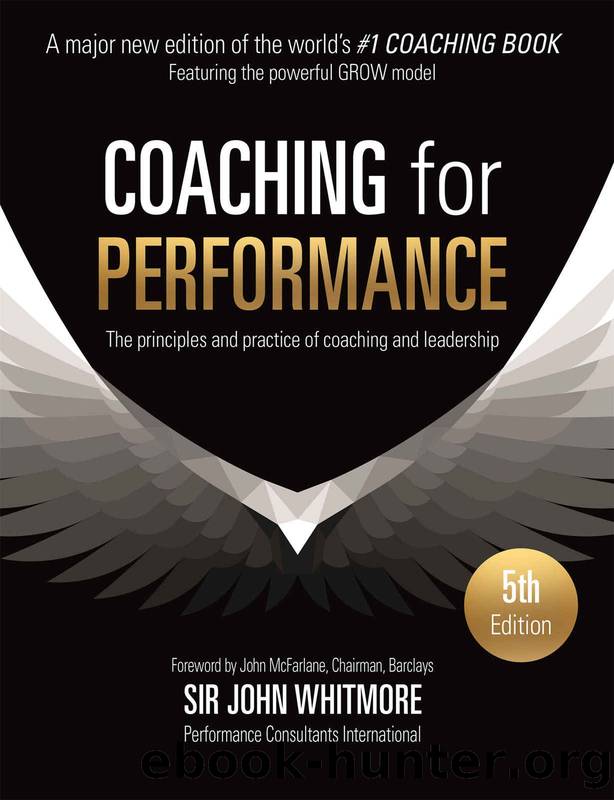Coaching for Performance: The Principles and Practices of Coaching and Leadership (People Skills for Professionals) by John Whitmore

Author:John Whitmore [Whitmore, John]
Language: eng
Format: azw3
Publisher: Hodder & Stoughton
Published: 2010-11-26T00:00:00+00:00
The purpose of this final phase of the coaching sequence is to convert a discussion into a decision. It is the construction of an action plan to meet a requirement that has been clearly specified, on ground that has been thoroughly surveyed, and using the widest possible choice of building materials. The âWâ in GROW stands for the will in âWhat will you do?â to emphasize the principle of will, intention, and responsibility. Without desire or the power of will, there is no real commitment to action. Once you have opened the coachee up to other perspectives and possibilities by asking the goal, reality, and options questions, it is time to tie the new insights down to action so that the new ideas are followed through. This will phase can be split into two stages:
⢠Stage 1: Accountability Set-up â define actions, timeframe, and measures of accomplishment.
⢠Stage 2: Follow-up and Feedback â review how things went and explore feedback for learning.
A recent McKinsey Quarterly article by Ewenstein et al. stated that many companies, such as GE, the Gap, and Adobe Systems, âwant to build objectives that are more fluid and changeable than annual goals, frequent feedback discussions rather than annual or semi-annual ones, forward-looking coaching for development rather than backward-focused rating and ranking.â The shift here is to development and continuous learning through a different type of feedback. And this has indeed been our experience â clients like Medtronic, a global leader in medical technology, services, and solutions with 88,000 employees currently, is a trailblazer in using a coaching approach to transform performance conversations. From a partnership that started back in 2008, this approach is now being adopted at the heart of Medtronicâs Performance and Career Development process to develop leaders to have a meaningful, coaching-based conversation about performance management and career development that is ongoing. And it is in the will phase that continuous development happens, because it is where people take what they have learned and apply it in their work. We shall return to the Medtronic example, but now letâs start the discussion by exploring the setting up of accountability.
Download
This site does not store any files on its server. We only index and link to content provided by other sites. Please contact the content providers to delete copyright contents if any and email us, we'll remove relevant links or contents immediately.
Time Management Made Easy: How to Cultivate New Habits, Improve Productivity and Get Things Done by Joshua Strachan(2417)
The 7 Habits of Highly Effective People by Stephen R. Covey & Sean Covey(2267)
The Concise Laws of Human Nature by Robert Greene(1913)
Doesn't Hurt to Ask by Trey Gowdy(1637)
Primal Leadership by Daniel Goleman(1282)
Hook Point: How to Stand Out in a 3-Second World by Brendan Kane(1245)
Don't Sweat the Small Stuff...and It's All Small Stuff by Richard Carlson(1121)
HBR's 10 Must Reads 2021 by unknow(1096)
The Power of 100! by Shaun King(1096)
Amazon Unbound by Brad Stone(1045)
100 Things Successful People Do by Nigel Cumberland(1029)
Master of One by Jordan Raynor(1008)
HBR's 10 Must Reads 2021 by Harvard Business Review(1007)
The Job Closer by Steve Dalton(993)
Lives of the Stoics by Ryan Holiday & Stephen Hanselman(969)
Declutter Your Mind: A step by step guide to learn to control your thoughts, stop worrying, relieve anxiety and eliminate panic attacks and negative thinking by Mia Chandler(968)
Conflicted by Ian Leslie(872)
The Book of Hope by Jane Goodall(872)
Coders at Work: Reflections on the craft of programming by Peter Seibel(847)
